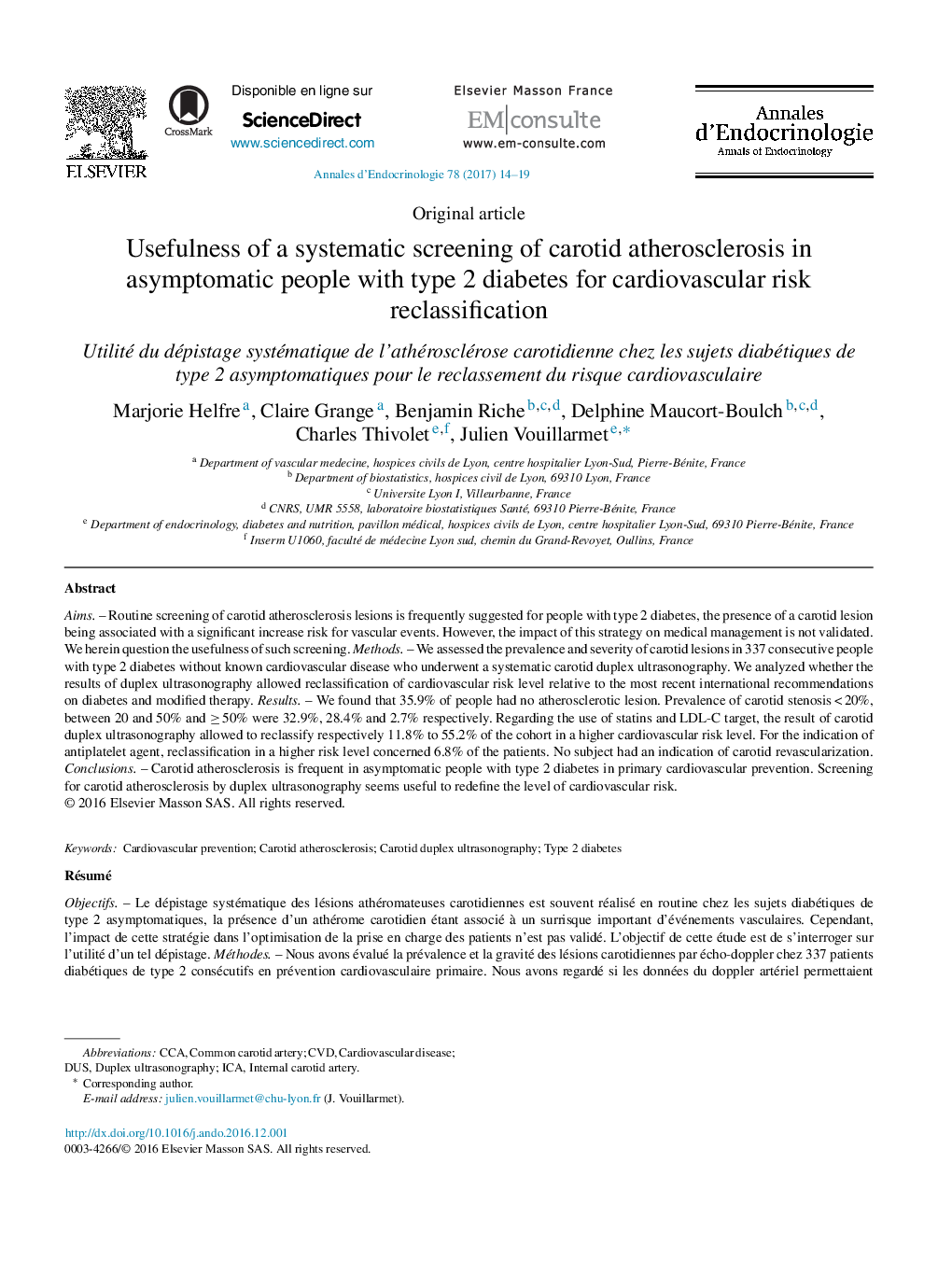| کد مقاله | کد نشریه | سال انتشار | مقاله انگلیسی | نسخه تمام متن |
|---|---|---|---|---|
| 5654404 | 1407275 | 2017 | 6 صفحه PDF | دانلود رایگان |

AimsRoutine screening of carotid atherosclerosis lesions is frequently suggested for people with type 2 diabetes, the presence of a carotid lesion being associated with a significant increase risk for vascular events. However, the impact of this strategy on medical management is not validated. We herein question the usefulness of such screening.MethodsWe assessed the prevalence and severity of carotid lesions in 337 consecutive people with type 2 diabetes without known cardiovascular disease who underwent a systematic carotid duplex ultrasonography. We analyzed whether the results of duplex ultrasonography allowed reclassification of cardiovascular risk level relative to the most recent international recommendations on diabetes and modified therapy.ResultsWe found that 35.9% of people had no atherosclerotic lesion. Prevalence of carotid stenosis < 20%, between 20 and 50% and â¥Â 50% were 32.9%, 28.4% and 2.7% respectively. Regarding the use of statins and LDL-C target, the result of carotid duplex ultrasonography allowed to reclassify respectively 11.8% to 55.2% of the cohort in a higher cardiovascular risk level. For the indication of antiplatelet agent, reclassification in a higher risk level concerned 6.8% of the patients. No subject had an indication of carotid revascularization.ConclusionsCarotid atherosclerosis is frequent in asymptomatic people with type 2 diabetes in primary cardiovascular prevention. Screening for carotid atherosclerosis by duplex ultrasonography seems useful to redefine the level of cardiovascular risk.
RésuméObjectifsLe dépistage systématique des lésions athéromateuses carotidiennes est souvent réalisé en routine chez les sujets diabétiques de type 2 asymptomatiques, la présence d'un athérome carotidien étant associé à un surrisque important d'événements vasculaires. Cependant, l'impact de cette stratégie dans l'optimisation de la prise en charge des patients n'est pas validé. L'objectif de cette étude est de s'interroger sur l'utilité d'un tel dépistage.MéthodesNous avons évalué la prévalence et la gravité des lésions carotidiennes par écho-doppler chez 337 patients diabétiques de type 2 consécutifs en prévention cardiovasculaire primaire. Nous avons regardé si les données du doppler artériel permettaient une reclassification du niveau de risque cardiovasculaire par rapport aux recommandations internationales de 2016 et modifiaient la prise en charge thérapeutique.RésultatsNous avons constaté que 35,9 % des personnes n'avaient aucune lésion athéromateuse. La prévalence des lésions carotidiennes < 20 %, entre 20 et 50 % et â¥Â 50 % étaient respectivement de 32,9 %, 28,4 % et 2,7 %. Concernant l'utilisation des statines et la cible de LDL-C, le résultat du doppler carotidien a permis de reclasser respectivement 11,8 % à 55,2 % de la cohorte à un niveau de risque cardiovasculaire plus élevé. Pour l'indication d'un antiagrégant plaquettaire, un reclassement à un niveau de risque supérieur a concerné 6,8 % des patients. Aucun sujet n'avait d'indication de revascularisation carotidienne.ConclusionsL'athérome carotidien est fréquent chez les sujets diabétiques de type 2 asymptomatiques en prévention cardiovasculaire primaire. Le dépistage systématique de l'athérome carotidien par écho-doppler semble utile pour redéfinir le niveau de risque cardiovasculaire.
Journal: Annales d'Endocrinologie - Volume 78, Issue 1, February 2017, Pages 14-19